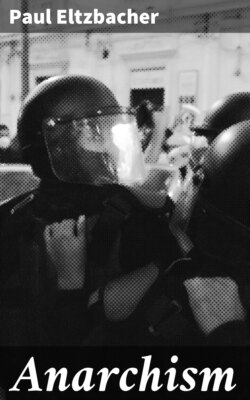Читать книгу Anarchism - Paul Eltzbacher - Страница 9
На сайте Литреса книга снята с продажи.
2.—THE STARTING-POINT
ОглавлениеTable of Contents
In accordance with what has been said, the starting-point of our study must be those non-conceptual notions of Anarchism and its species, having in view one and the same group of teachings, which are most widely diffused among the men who at present are scientifically concerned with Anarchism.
1. How can it be known what group of teachings the non-conceptual notions of Anarchism and its species most widely diffused among the men at present scientifically concerned with Anarchism have in view?
First and foremost, this may be seen from utterances regarding particular Anarchistic teachings, and from lists and descriptions of such teachings.
We may assume that a man regards as Anarchistic those teachings which he designates as Anarchistic, and, further, those teachings which are likewise characterized by the common qualities of these. We may further assume that a man does not regard as Anarchistic those teachings which he in any form contrasts with the Anarchistic teachings, nor, if he undertakes to catalogue or describe the whole body of Anarchistic teachings, those teachings unknown to him which are not characterized by the common qualities of the teachings he catalogues or describes.
What group of teachings those non-conceptual notions of Anarchism and its species which are most widely diffused among the men at present scientifically concerned with Anarchism have in view, may be seen secondly from the definitions of Anarchism and from other utterances about it. We may doubtingly assume that a man regards as Anarchistic those teachings which come under his definition of Anarchism, or for which his utterances about Anarchism hold good; and, on the contrary, that he does not regard as Anarchistic those teachings which do not come under that definition, or for which these utterances do not hold good.
When these two means of knowledge lead to contradictions, the former must be decisive. For, if a man so defines Anarchism, or so speaks of Anarchism, that on this basis teachings which he declares non-Anarchistic manifest themselves to be Anarchistic,—and perhaps other teachings, which he counts among the Anarchistic, to be non-Anarchistic,—this can be due only to his not being conscious of the scope of his general pronouncements; therefore it is only from his treatment of the individual teachings that one can find out his opinion of these.
2. These means of knowledge inform us what group of teachings the non-conceptual notions of Anarchism and its species most widely diffused among the men at present scientifically concerned with Anarchism have in view.
We learn, first, that the teachings of certain particular men are recognized as Anarchistic teachings by the greater part of those who at present are scientifically concerned with Anarchism.
We learn, second, that by the greater part of those who at present are scientifically concerned with Anarchism the teachings of these men are recognized as Anarchistic teachings only in so far as they relate to law, the State, and property; but not in so far as they may be concerned with the law, State, or property of a particular legal system or a particular group of legal systems, nor in so far as they regard other objects, such as religion, the family, art.
Among the recognized Anarchistic teachings seven are particularly prominent: to wit, the teachings of Godwin, Proudhon, Stirner, Bakunin, Kropotkin, Tucker, and Tolstoi. They all manifest themselves to be Anarchistic teachings according to the greater part of the definitions of Anarchism, and of other scientific utterances about it. They all display the qualities that are common to the doctrines treated of in most descriptions of Anarchism. Some of them, be it one or another, are put in the foreground in almost every work on Anarchism. Of no one of them is it denied, to an extent worth mentioning, that it is an Anarchistic teaching.
